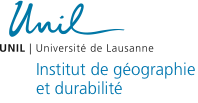Institute of Geography and Sustainability of the University of Lausanne
Research projects
Ecology and freedom: liberalism versus republicanism
The central issue of this work is that of the relationship between environmental finiteness and individual liberty. By environmental finiteness one should understand the set of diverse ecological constraints that limit human action. These limits are of two general kinds: on the one hand the availability of natural resources, and on the other hand the carrying capacity of ecosystems and biogeochemical cycles (chapter 1). The thesis defended here is that libertarian and liberal conceptions of liberty conflict with the necessity to take such limits into account, and that a neo-republican approach is best suited to address environmental issues. Libertarian theories, right-wing as well as left-wing, are in particular not able to take resource scarcity into account because they argue for an unlimited right of individuals to appropriate those resources. This point is in contradiction with the systemic nature of scarcity and with the absence of substitutes for some essential resources (chapters 2 and 3). The liberal doctrine of neutrality, as associated with the harm principle, is unsuitable when addressing global environmental issues like climate change. Causal mechanisms leading to environmental harm are indirect and diffuse, which prevents the assignation of individual responsibilities. This makes the justification of coercive environmental policies difficult (chapter 4). These difficulties stem above all from two characteristic features of libertarian and liberal doctrines: their atomistic social ontology and their conception of freedom as liberty of choice. Philip Pettit's neo-republicanism on the other hand is able to address these problems thanks to its holist social ontology and its conception of liberty as non-domination. This doctrine offers a conception of liberty compatible with environmental limits and theoretical resources able to justify demanding environmental policies without sacrificing too much in terms of liberty (chapter 5).
Publications
| Fragnière, A. (2014). Climate Change, Neutrality and the Harm Principle. Ethical perspectives / Catholic University of Leuven ; European Centre for Christian Ethics, 1: 79-99. | Info | |
| Fragnière, A. (2013). Écologie et liberté : apports et insuffisances de l'écologie politique. In Antonioli, M., Théories et pratiques écologiques : de l'écologie urbaine à l'imagination environnementale. Nanterre : Presses Universitaires de Paris Ouest. 137-154 | Info | |
| Fragnière, A. (2012). La liberté des Modernes à l'épreuve de la finitude. Natures Sciences Sociétés, 20(2): 192-200. Doi:10.1051/nss/2012019 | Info |

